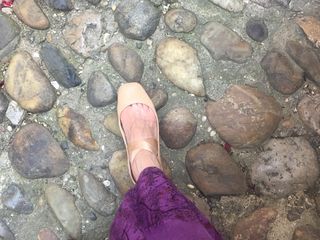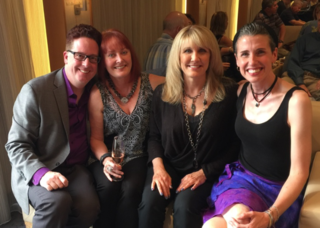OCD
The Five Things My OCD and I Learned in the South of France
Why my OCD is very sorry it threw a tantrum in a train station.
Posted June 5, 2017
My last blog post was all about what I packed for my trip to France, knowing that my OCD was going to want to tag along. For this post, I thought I’d share the five things my OCD and I learned on our French adventure as we sailed on the Viking Heimdal from Avignon to Lyon.
1. Expect the Unexpected
As I mentioned in my last post, I was expecting my OCD to join me on our Viking river cruise, so much so that I packed both for it (its tissues and knitting) and to deal with it (the Four Keys). What became clear almost immediately, however, is that it’s good to expect the unexpected from OCD.
For instance, as I sat in my window seat on the Delta flight to Amsterdam, the first leg of our journey to get to France, my OCD crawled up onto the top of the seat in front of me (so that it could have my full attention), and began to throw a fit:
WE MUST GET OFF THIS PLANE! IT’S GOING TO BE THE TARGET OF A TERRORIST ATTACK, I JUST KNOW IT! THERE ARE SO MANY PEOPLE ON THIS PLANE AND SOMEONE IS PROBABLY CARRYING A BOMB AND WE’RE GOING TO DIE, AND OH, SHALA, SHALA, CAN WE PLEASE, PLEASE, PLEASE GET OFF???!!!
Handing my OCD a whole pack of tissues, hoping it didn’t drop them on the poor person sitting in front of me, I leaned over to my friend and traveling companion, Becky.
“My OCD is coming unglued right now.”
“Oh, really? What about?”
My OCD, sobbing loudly, blew its nose. I raised my voice to speak over it.
"It’s come up with something totally new! It’s afraid we’re going to die in a terrorist attack. I fly all the time, but I think because we’re going out of the country and I haven’t been out of the US for years, it’s feeling uncertain and is worried that something bad is going to happen.”
“Something bad might happen," Becky offered. Becky is a psychologist who treats OCD, so she knows exactly how to respond to my OCD's worries.
“Yup. It might. Are you going to eat now or wait until we take off?”
I acknowledged my OCD’s new content and the fact that maybe what it was worried about could happen and then went back to what I was doing, which was going on vacation. Then my OCD quickly realized it didn’t have any control over the situation, slid down off the top of the seat, dug around in its duffel bag, found its knitting and got busy ignoring me (which I love). But I marveled at how it pulls random, unexpected content out of nowhere, and I realized it would be good for me, and everyone with OCD, to always expect the unexpected from this disorder.
2. Use the Four Keys to Help You Throw OCD Off Its Game
While my OCD mostly left me alone on this trip, it did have its moments. It didn’t, for instance, like the restroom that I used before taking our excursion on le Train de L’Ardèche with Becky and our new friends, Monte and Annette, and it threw a tantrum as I was leaving the bathroom stall:
WE’RE IN A FOREIGN COUNTRY! WE’RE JETLAGGED! SLEEP-DEPRIVED! OUR IMMUNE SYSTEM IS COMPROMISED! WE’RE GOING TO GET SICK IF WE DON’T WASH OUR HANDS!

I took this as an opportunity to use the Four Keys, the motivational wrapper around exposure and response prevention therapy (ERP) for OCD. “Great, OCD. Glad you brought this up, as I wanted an opportunity to practice! You know, it’s in my Greater Good to not wash my hands. Especially since I don’t have a lot of control over anything, including whether we get sick. In fact, since you’re throwing a fit, I’m not going to wash my hands now or the rest of the day. How ‘bout them apples?” I said as I left the bathroom, hands fully unwashed.
OCD kept screeching for about a minute after I got on the train, then quickly calmed down, got out its knitting and proceeded to ignore me, making it much easier to enjoy the ride with my friends. And I didn’t wash my hands for the rest of the day.
As a general rule, I use the Four Keys to go after my OCD hard and fast. It’s an aggressive disorder, so I treat it aggressively. Sometimes it helps to think of it as a recalcitrant child throwing a tantrum. The child is perfectly welcome to have a meltdown, but he is going to lose privileges if he does. I might have washed my hands had my OCD kept quiet (because sometimes I wash them, sometimes I don’t, just depends on my mood), but because it made a fuss, it got “punished” with a whole day of unwashed hands. My OCD has learned to think twice before bothering me, because it knows that throwing a fit is going to result in the Four Keys, not the certainty and comfort it wants.
3. Love Cobblestones
Jeff’s and my friend Reid Wilson, Ph.D., wrote a wonderful blog post for Psychology Today earlier in 2017 called Why Discomfort Can Be So Good for You: There's a good reason so many people embrace cobblestones and free weights. The post stuck with me because I hadn’t known, until reading Reid’s post, that walking on cobblestones had such salutary effects!
The South of France is filled with towns paved in cobblestones, and each day Becky, Monte, Annette, and I would go on cobblestoned walking tours. The most “cobbly” of these excursions was in the medieval town of Pérouges, where I found walking in my ballet flats to be rather challenging and pretty uncomfortable. As I explored the town, I wasn’t walking so much as I was hiking on rocks, and I realized what a good metaphor navigating these cobblestones was for this whole trip, and for recovering from OCD.

Because this trip, as fun as it was, was out of my comfort zone. It had been seven years at least since my last trip overseas. I’d never taken a river cruise. I’d never been to this part of France. I’d never shown up for a vacation where someone else was planning the itinerary. I also hadn’t spoken any French (although I used to be almost fluent) in the last twenty years.
But I pushed past all that, turning all my plans over to Christine, our Viking program director, and diving enthusiastically into life on the ship and into our daily excursions, where I pushed myself to speak French and even have conversations in French—rusty, disjointed, slow conversations, but conversations nonetheless—whenever possible.

Pushing back discomfort and uncertainty is what it takes not only to have a fabulous vacation (and oh, was it! Becky, Monte, Annette, and I are already planning our next Viking cruise!), but to have a fabulous life, even when you have OCD. Search out and love cobblestoned streets—push yourself to take risks, to explore, to reach toward what matters to you—even when doing so requires some awkward and uncomfortable steps. I could have skipped all the uncertainty inherent in traveling abroad and had a perfectly comfortable vacation here at home, but I would have missed having the time of my life with my friends new and old.
4. Look for Subtle Avoidance in Your Recovery
Avoidance of feared situations is what maintains OCD. As I’ve progressed over the last seven years of my recovery, I’ve worked hard to get rid of avoidance. But this trip clued me into some subtle avoidance I’d overlooked: working too hard and not taking real vacations.
Many of the clients I see in my professional practice comment on how they like to stay busy, as it keeps the OCD at bay. And while I think that’s fine, I also think staying busy can become a compulsive, maladaptive coping mechanism for dealing with OCD. I have used working (and over-working) as a way to control my OCD symptoms since I was in high school and to such an extent that I now battle with workaholism. A process addiction that can be unfortunately lauded in our society, workaholism used to help me avoid my OCD. But now it ironically steals the joy out of my life, just like the OCD it used to keep me from experiencing.

Going on this vacation made me realize that I need to take more time off. That much of the time I'm rushing and racing just like Emmy Rossum describes in her beautiful song Slow Me Down. That my workaholism is actually a form of subtle avoidance, a leftover vestige from when I had untreated OCD, and I don’t need it anymore. In fact, I’d say that 95+% of my time on this Viking cruise was completely OCD-free. I was just on vacation like all the other guests on the ship, enjoying the beautiful Rhône river and gorgeous French sun.
5. Make Your Life in Recovery Better Than One With OCD
Jonathan Grayson, Ph.D., and I did a talk at the International OCD Foundation conference a few years ago about building an OCD recovery maintenance plan, and “make your life in recovery better than one with OCD” was one of the main tips that we offered.

My time in France reconfirmed why building a full, rich life is so important to all of us with OCD. OCD wants safety, security, comfort. It wants the devil it knows, even if that devil makes our worlds smaller….and smaller….and smaller. If we listen to OCD, we start to think that we also want safety, security, comfort. But we don’t! Because the old saying is true: ships are safe in a harbor, but that’s not what ships are made for! All of us with OCD are “safe” living limited lives, but that’s not what we are made for! If we build lives full of people, places, and experiences we love, it will be harder for OCD to convince us to do its bidding, because we’ll recognize more and more acutely that its bidding always comes at the expense of the people, places and experiences we love. If we pursue the activities and interests we enjoy (keeping the subtle avoidance of workaholism mentioned above in mind), we’re less likely to fall prey to the tantrums of OCD and more likely to give ourselves the chance to have the experiences and adventures—and the joy—that we all deserve.
If you'd like to learn more about how to use the Four Keys to live a great life, even with OCD, sign up for Beyond the Doubt's KeyWords, our free, daily motivational emails for people with OCD.




